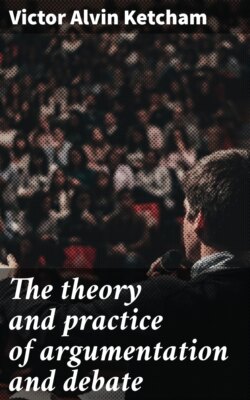Читать книгу The theory and practice of argumentation and debate - Victor Alvin Ketcham - Страница 27
На сайте Литреса книга снята с продажи.
(a) Excluding irrelevant matter.
ОглавлениеThe first task is to cut away all surplusage. The proposition as it now stands, should be closely examined in order to determine just what must be proved. Neither the affirmative nor the negative should undertake the burden of proving more than is necessary. In the discussion of the proposition “Resolved, that Prohibition is preferable to High License,” it is not necessary for the affirmative to prove that temperance is a virtue. The task before these debaters is to show only that prohibition is preferable to high license as a method of dealing with the liquor traffic. It is not necessary for the negative to attempt to prove that temperance is not a virtue; their task is to show only that high license is preferable to prohibition. It is true that temperance as an abstract virtue is very closely related to the subject-matter of the proposition, but it is not one of the real points at issue. When the question has been narrowed down to the method of dealing with the liquor traffic, each side may prove this point in the way which appears most effective. Each may assert that its method of control is preferable because theory and practice show it to be better for (a) social, (b) political, and (c) economic reasons. Any other division of the subject which seems effective may be adopted.
It is evident from the above illustration that certain matters which are relevant to the general subject should be eliminated in order that the audience may understand just what must be proved. Everything that is not relevant to the proposition as stated should be excluded.
